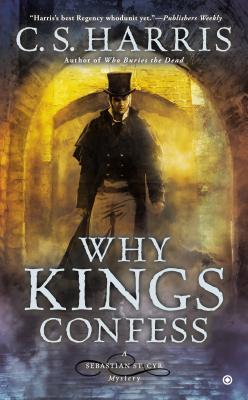 Why Kings Confess (Sebastian St. Cyr, #9) by C.S. Harris
Why Kings Confess (Sebastian St. Cyr, #9) by C.S. Harris Format: ebook
Source: purchased from Amazon
Formats available: hardcover, paperback, ebook, audiobook
Genres: historical fiction, historical mystery, mystery
Series: Sebastian St. Cyr #9
Pages: 340
Published by Berkley, New American Library, Obsidian on March 4, 2014
Purchasing Info: Author's Website, Publisher's Website, Amazon, Barnes & Noble, Kobo, Bookshop.org, Better World Books
Goodreads
The gruesome murder of a young French physician draws aristocratic investigator Sebastian St. Cyr and his pregnant wife, Hero, into a dangerous, decades-old mystery as a wrenching piece of Sebastian’s past puts him to the ultimate test.
Regency England, January 1813: When a badly injured Frenchwoman is found beside the mutilated body of Dr. Damion Pelletan in one of London’s worst slums, Sebastian finds himself caught in a high-stakes tangle of murder and revenge. Although the woman, Alexi Sauvage, has no memory of the attack, Sebastian knows her all too well from an incident in his past—an act of wartime brutality and betrayal that nearly destroyed him.
As the search for the killer leads Sebastian into a treacherous web of duplicity, he discovers that Pelletan was part of a secret delegation sent by Napoleon to investigate the possibility of peace with Britain. Despite his powerful father-in-law’s warnings, Sebastian plunges deep into the mystery of the "Lost Dauphin”, the boy prince who disappeared in the darkest days of the French Revolution, and soon finds himself at lethal odds with the Dauphin’s sister—the imperious, ruthless daughter of Marie Antoinette—who is determined to retake the French crown at any cost.
With the murderer striking ever closer, Sebastian must battle new fears about Hero’s health and that of their soon-to-be born child. When he realizes the key to their survival may lie in the hands of an old enemy, he must finally face the truth about his own guilt in a past he has found too terrible to consider....
My Review:
Once upon a time there was a legend about a prince locked in a tower, never to be seen again. You might be thinking this sounds familiar, but that there were two princes. This is not that story. Although the idea that the one about the two princes might have inspired this version, or at least might have made this version seem a bit more plausible, is not outside of the realms of possibility.
The earlier version of this legend, the one about the two princes in the tower, refers to the end of the Wars of the Roses, young Edward V of England and his brother Richard, and the perfidy – at least according to Shakespeare’s popular account, of their uncle Richard III.
Bones were discovered in the tower two centuries later and ascribed to the bodies of those two little boys. No one knows what really happened, hence the persistent legend.

While the truth about the boys’ fate is was never discovered, the fact that it wasn’t clear in their own time led to a seemingly endless parade of opportunists pretending to be one or the other of the ‘lost’ princes, resulting in a simmering cauldron of uncertainty and doubt about the legitimacy of the English throne and the ability to topple whoever was sitting on it that lasted for DECADES.
In light of that history, both the known and the unknown, it’s not a stretch to think that, in the wake of the French Revolution, when the fate of the last heir to the throne seems to have been equally suspiciously, dubiously, and questionably unknown, that there would be rumors and even downright hopes that Louis XVII, the ‘Lost Dauphin’ (then aged EIGHT), had been spirited away from the inhuman conditions in which he was imprisoned to an unknown sanctuary, and that the child who died in his cell two years later was an imposter.
It seems like I’m talking all about the distant past rather than about the present matter in this book. And I am. But I’m also very much not, as ALL of the books in the Sebastian St. Cyr series are intimately involved with not merely the Regency period in which they are set, but with the great doings and underhanded dealings of the very month and year in which they take place.
Why Kings Confess opens in January of 1813. Those two princes in England’s Tower of London are over three centuries dead, but the Lost Dauphin is merely two decades into his, if he truly IS in his grave, that is. Napoleon Bonaparte is the Emperor of the French, but his popularity is very much on the wane after his catastrophic retreat from Russia’s most implacable field commander – ‘General Winter’.
As the story begins, Napoleon has sent a not-so-secret (utterly plausible but entirely fictional) embassy to England to negotiate a peace that England, and its unpopular Prince Regent, need as much as Napoleon does after ten years of the ruinously costly Napoleonic Wars.
The murder that opens Why Kings Confess is that of a young French doctor who was part of that peace overture. The palace, in the person of the shadowy power behind the throne, Lord Charles Jarvis, wants the murder hushed up. His enemy and son-in-law Sebastian St. Cyr, Viscount Devlin, disagrees. Strenuously.
Devlin knows the man wasn’t killed by footpads, because footpads don’t cut out their victims’ hearts – just their money and other valuables. As Devlin investigates, it begins to appear that the murder wasn’t related half so much to the current embassy as it was to the fate of the Lost Dauphin.
The deaths are certainly related to someone’s past, but when the second member of the embassy is also murdered, Devlin is forced to look both further afield and closer to home. Because the past that is coming to light is Devlin’s own.
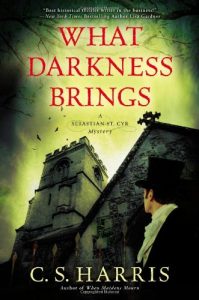 Escape Rating A-: This week already felt like a week and a half by the time I picked this book up on Wednesday – and there were still two days to go. I needed a comfort read, and it had been just long enough since I finished my previous St. Cyr read that I was more than ready to dive back into Devlin’s era and escape my own for a bit. I confess that Why Kings Confess was absolutely the right book at the right time.
Escape Rating A-: This week already felt like a week and a half by the time I picked this book up on Wednesday – and there were still two days to go. I needed a comfort read, and it had been just long enough since I finished my previous St. Cyr read that I was more than ready to dive back into Devlin’s era and escape my own for a bit. I confess that Why Kings Confess was absolutely the right book at the right time.
What makes this series work for me, every single time, is that every single story is an example of the proverbial three-legged stool where three story threads provide strength and balance to the story as a whole, keeping the reader sitting pretty and enthralled from the first page to the last.
First, there’s a murder. Generally there’s more than one. But when that first body drops Devlin becomes wrapped up in a case that reaches over to the second leg of the plot, the historical period in which this story is set, not just the year but down to the month and even the day, and the tendrils of that history reach down to the stinking underbelly of the glittering Regency all the way up to the dirty political deals being done by the high and mighty. And last, there’s the third leg that keeps it all in balance, as the entire series is Sebastian St. Cyr’s journey from a young, scarred, disillusioned war veteran to become the powerful force for justice that he needs to be to keep his own demons at bay.
I started this series for the historical mystery setting. St. Cyr has been a fascinating character from the very first page of What Angels Fear, and following his dangerous and deadly journey has been riveting from that beginning. But it’s the way that the character grows and changes, the way that he heals from the damage of war, in fits and starts and one step forward and sometimes two steps back, that makes him a leader, and a character, worth following from book to book and year to year.
 At the same time, the thing that makes the series different from other historical mysteries is its deep and penetrating dive into its historical setting. I know enough to get caught up in the political skullduggery behind the deaths to get sucked right in, and then find myself looking up details just to get that little bit more meat out of everything he’s just experienced and I’ve just read.
At the same time, the thing that makes the series different from other historical mysteries is its deep and penetrating dive into its historical setting. I know enough to get caught up in the political skullduggery behind the deaths to get sucked right in, and then find myself looking up details just to get that little bit more meat out of everything he’s just experienced and I’ve just read.
Which is exactly the experience I expect from the next book in my St. Cyr catch-up read, Who Buries the Dead, the next time I go flailing around for a comfort read of justice delivered by a riveting character who cannot make himself stop trying to deliver that justice in spite of the odds stacked against him.

 Women of the Post by
Women of the Post by 
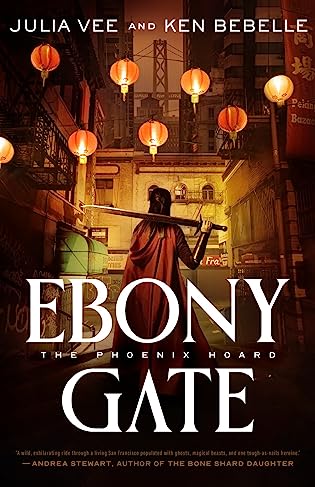 Ebony Gate (Phoenix Hoard, #1) by
Ebony Gate (Phoenix Hoard, #1) by  (There are also touches (or more) of
(There are also touches (or more) of  That being said, I want to give a big shoutout to the narrator, Natalie Naudus, who also narrated Max Gladstone’s
That being said, I want to give a big shoutout to the narrator, Natalie Naudus, who also narrated Max Gladstone’s 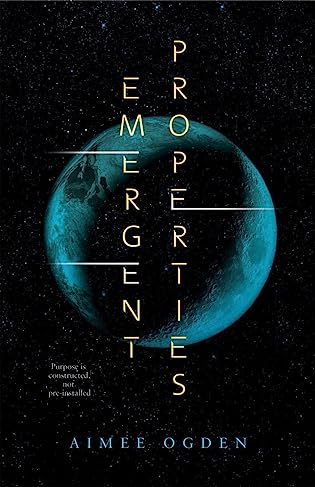 Emergent Properties by
Emergent Properties by  Montego: A Glass Immortals Novella by
Montego: A Glass Immortals Novella by 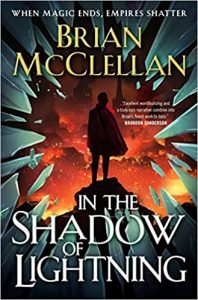 Escape Rating A: I had the oddest reaction at the end of Montego. I teared up. Not because this story ends on a sad note, because it doesn’t. It ends on a note of triumph and hope. But I wanted to cry because I know what those hopes lead to, and there’s a lot of heartbreak ahead for Demir, Montego and Kizzie. They just don’t know it yet.
Escape Rating A: I had the oddest reaction at the end of Montego. I teared up. Not because this story ends on a sad note, because it doesn’t. It ends on a note of triumph and hope. But I wanted to cry because I know what those hopes lead to, and there’s a lot of heartbreak ahead for Demir, Montego and Kizzie. They just don’t know it yet.

 Current Giveaways:
Current Giveaways: Blog Recap:
Blog Recap: Coming This Week:
Coming This Week:

















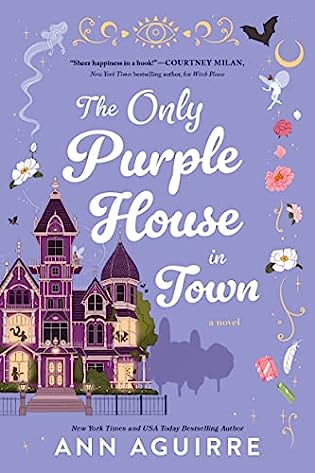 The Only Purple House in Town by
The Only Purple House in Town by 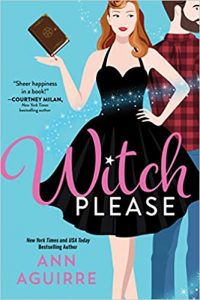 Iris Collins is at the end of her rope – and the knot she’s tied in that rope seems to be slipping through her fingers. And just at the point where all of her choices seem to range from bad to worse the universe throws her a lifeline. Ironic that, as the lifeline is the direct result of a death in her family. Her Great-Aunt Gertie has died and left her a charming but slightly dilapidated house in witch-friendly St. Claire, Illinois. All Iris has to do is get herself there, sign some papers, and she’ll have a rent-free place to live and a fresh start in a life that could seriously use one.
Iris Collins is at the end of her rope – and the knot she’s tied in that rope seems to be slipping through her fingers. And just at the point where all of her choices seem to range from bad to worse the universe throws her a lifeline. Ironic that, as the lifeline is the direct result of a death in her family. Her Great-Aunt Gertie has died and left her a charming but slightly dilapidated house in witch-friendly St. Claire, Illinois. All Iris has to do is get herself there, sign some papers, and she’ll have a rent-free place to live and a fresh start in a life that could seriously use one. Because there’s a wicked witch (even if she isn’t REALLY a witch) trying to run them out of town with an attack of flying monkeys (in the person of government bureaucracy and officialdom) who doesn’t want paranormal creatures in her perfectly normal little town.
Because there’s a wicked witch (even if she isn’t REALLY a witch) trying to run them out of town with an attack of flying monkeys (in the person of government bureaucracy and officialdom) who doesn’t want paranormal creatures in her perfectly normal little town.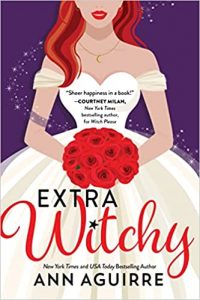 The story has a lot of the same cozy fantasy vibes – just with a paranormal twist – as Travis Baldree’s marvelous
The story has a lot of the same cozy fantasy vibes – just with a paranormal twist – as Travis Baldree’s marvelous  Days at the Morisaki Bookshop by
Days at the Morisaki Bookshop by  Escape Rating A-: This is simply a lovely story. It’s a bit of a combination of
Escape Rating A-: This is simply a lovely story. It’s a bit of a combination of 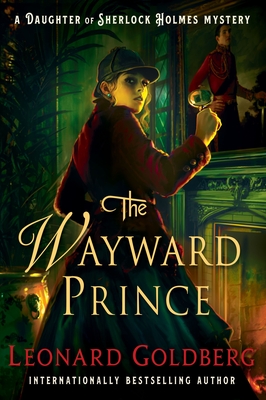 The Wayward Prince (The Daughter of Sherlock Holmes Mysteries, #7) by
The Wayward Prince (The Daughter of Sherlock Holmes Mysteries, #7) by  Escape Rating A-:
Escape Rating A-: